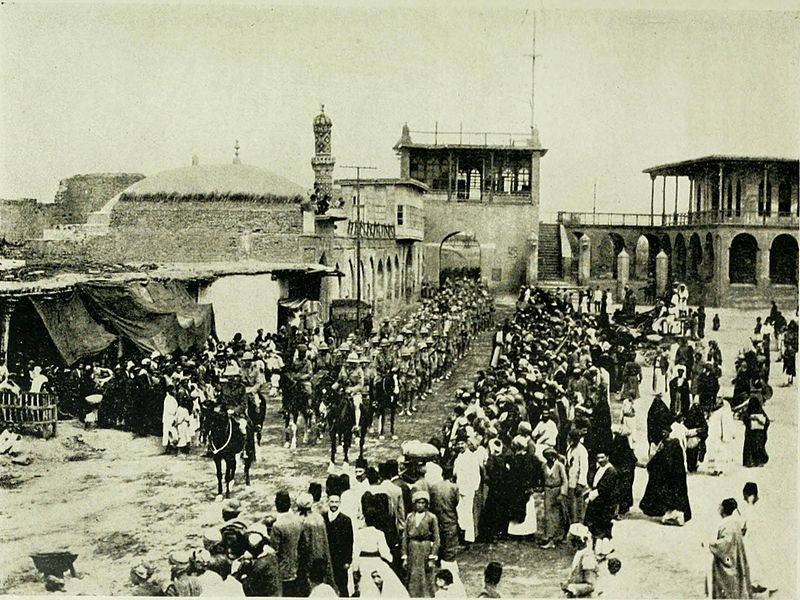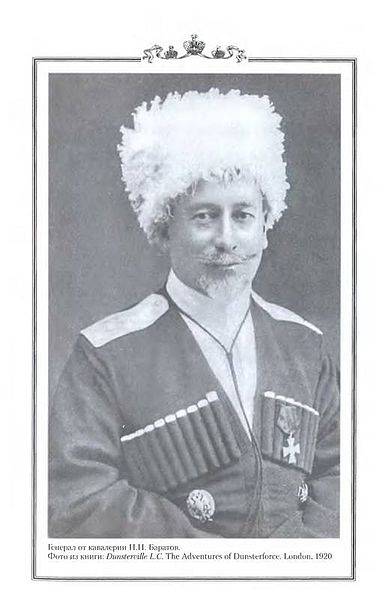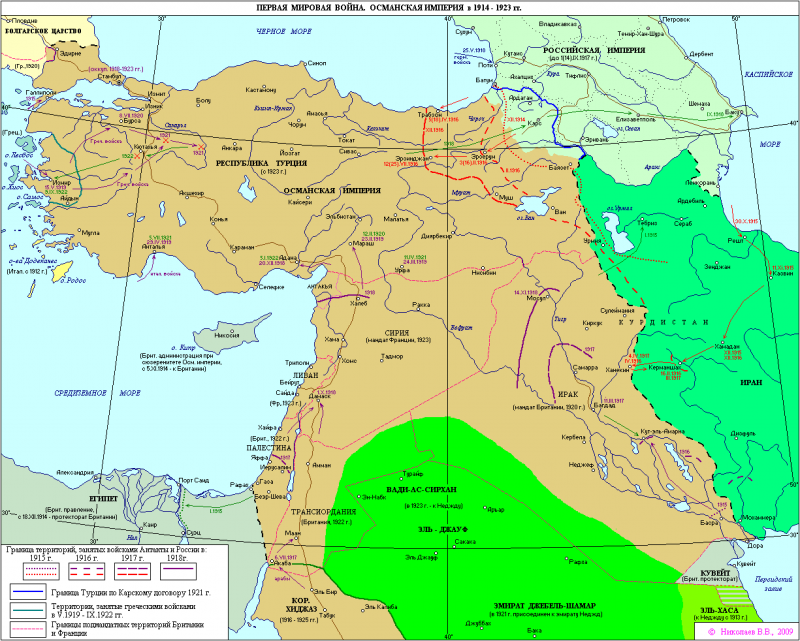Mosul operation. How the British, until recently, tried to use the Russian "cannon fodder"
In the Baghdad direction, Baratov’s troops pursued the enemy and caused great damage to the Turks. By 6 (19) March 1917, the Russian troops reached Miantag. Here, the retreating 2-I Turkish Infantry Division occupied the defenses to cover the flank and rear of the 6-th army, retreating under pressure from British troops. The 1-I Caucasian Cossack Division, advancing along the Miantag Gorge in the area of Qasr-Shirin, launched an attack of the fortified position of the 2-division, which locked the exit from the mountain gorge. However, due to the fact that the infantry and artillery were far behind, the Russian troops managed to take the Miantag only on March 17 (30).
The British have made great strides. In early March, they began the battle for Baghdad. Turkish troops repulsed the attack at the confluence of the Diyala and Tigris rivers, south of the city. Then the British decided to transfer the main forces to the north, bypass the Turkish troops and attack the city from the unprotected side. The Turkish defense collapsed and the Ottomans fled. 11 March, pursuing the retreating Ottoman troops, the British entered Baghdad. As a result of this operation, about 9000 Turkish soldiers fell into British captivity. The Ottoman province, with its center in Baghdad, became the first province to be taken over by the British army. Governor-General in Mesopotamia was appointed General Maud. The Turkish command was forced to begin the formation of a group of troops to prevent the British offensive in the direction of Mosul. The German command allocated the headquarters of the front led by Falkenhain (former head of the German General Staff) and organized a special Asian corps to manage this campaign. But poor communications, general economic disruption in Turkey and the frivolity of the Turkish high command, all this did not allow for the normal preparation of the operation. As a result, the German units were sent to Syria. Minor Turkish reinforcements were sent to the Mesopotamian front, which could not change the situation.
Meanwhile, the British 10 (23) March took Sheraban and moved towards Beled. In the Bakuba area, the British concentrated a cavalry brigade with the aim of advancing along the right bank of the Diyala River. While the Russian troops were fighting with the enemy at Miantag, the British brought down the rearguards of the 6 of the Turkish army and 12 (25) of March took Jeas Hamrin. March 22 (April 4) Russian cavalry occupied Khanakin and fought with the Turks at Deck on the crossing over Diyala, on the right bank of which parts of the 6 Army retreated to Suleymaniyah. A Cossack hundred was sent to communicate with the British in Kizil-Rabat. In addition, in early April, radio communication was established with the headquarters of General F.S. Moda, and staff officers were periodically sent there. March 24 (April 6) The Turks destroyed the bridge at Decke and took a strong position on the right bank of the river.
Having taken a position west of Khanakin, the Russian troops (about 3 thousand soldiers) experienced a severe food shortage, as communications with Enzeli stretched for 800 km. The British categorically refused to share their abundant reserves, and offered the Russians to pursue the Turks in the direction of Kifri. They themselves planned to thrust the Ottoman troops along the Tigris. In connection with the development of hostilities on the Mesopotamian front, the Russian command planned to create a new rear corps at the junction of the 7 and 1 of the Caucasian cavalry corps to operate in the direction of Suleymaniyah, in the region of Credj (40 km west of Tehran). solve the problem of supplying troops. These four corps were to form a new 2-th Caucasian army under the command of General Baratov. However, due to the general collapse in 1917, this plan could not be implemented.

British troops enter Baghdad
Mosul operation
In early April, reaching Diyala, the Russians and the British stopped the persecution of the Turks. March 28 (April 10), the Chief of the British General Staff, General Robertson, suggested that the Russians attack Mosul so that the British could focus on actions in the Tigris Valley. According to the British, the Russians could interrupt the posts of the 6 of the Turkish army, shorten their front and threaten the right flank of the 2 of the Turkish army. At the same time, this allowed the British troops to transfer their efforts to the area of the Euphrates River, which allowed them to intercept another supply line of the 6 Army.
However, Baratov, considering the general condition of the troops, poor supply, sprawling communications and lack of organization of the rear of the corps, considered it appropriate to stop the movement in Mesopotamia. Meanwhile, the British army under Mode (1 British, 5 Indian Infantry Divisions, one cavalry brigade, more than 60 thousands of bayonets and sabers with 200 guns), continued to advance north with their left wing. General Maud expressed sharp dissatisfaction with the ally’s passivity, and suggested organizing the supply of the Russian detachment if he went on the offensive against Kifri. But the commander of the Caucasian front, General N. N. Yudenich, who was well aware of the collapse of the army, spoke out against the continuation of the Mosul operation.
The interim government, while continuing to pursue the military-political line of “war to a victorious end” in the interests of Britain and France, pressed on the command of the Caucasian army, demanding support for the allies. The commander-in-chief of the Caucasian front, Yudenich, reported a catastrophic loss of the army from hunger and disease: only from 1 to 18 in April, 30 thousand people were out of action from scurvy and typhoid. There has also been a depletion of vehicles and major supply problems. The nekomplekt carts reached 55%, horses - 24%, personnel in the wagon train - 52%. Some artillery batteries in positions and many transports almost lost horses. It was possible to hold the position of the Russian army only because things were no better for the Turkish army. Under these conditions, the command of the Caucasian army considered it expedient to withdraw the army to the supply bases: the center - to Erzerum, the right flank - to the Russian border. This made it possible to improve supply, put in order and save the remaining troops. True, this withdrawal reduced the front and liberated part of the Turkish troops in the Caucasus, which worsened the position of the British. As a result, this sensible offer was rejected by the Stake, which strenuously pleased the allies. May 31 (June 13) Yudenich, who proposed to withdraw the troops back to the supply bases, was replaced by General MA Przhevalsky. Baratov, who was replaced for a while by Lieutenant-General A. A. Pavlov, was returned to the post of corps commander.
Offensive actions were hampered by extremely difficult natural conditions. It was a terrible heat - it was reported 68 ° C with a strong wind. The Russians did not have special equipment, in the units located in the malaria region of Diyala, the incidence reached 80%. The command had to leave only two hundred in the area to observe the Turks and to communicate with the British, while the rest of the forces were taken to the mountainous regions of Persia.
For the operation on the Mosul direction, parts of the 7 Caucasian Corps were concentrated, which were concentrated near Sakiz, and the 1 Caucasian Cavalry Corps, which was to advance from Senna to Penjvin-Suleymaniyah-Kirkuk. This offensive, according to the command, was to divert significant enemy forces and provide great assistance to the actions of the British army. However, our troops had many problems. The possibility of carrying out the Mosul operation depended on the conditions of supply. The main problem was the lack of pasture, as the summer sun completely burns grass in the Mesopotamian foothills. Another problem was the depreciation of the ruble in Persia and the absence of local currency among the troops. The British offered to provide a loan in pounds, but instead demanded the resignation of the intractable Baratov, to which the Russian command did not agree. In addition, the Kurds intensified their actions, attacks on Russian units began, and the Persian government demanded the withdrawal of troops.
The offensive was launched by separate units on the front of the 7 (10) June 23 (1 (13)) 26 Corps. Initially, the offensive was successful. In Urmia region of the Kurdistan unit (3-I Kuban Cossack Division, shelf guards and Turkestan arrows) in the stubborn fighting 10-11 (23-24) in June rejected the Turks to Rouen pass, 17 (30) in June captured the position on a ridge Kara Severiz , and 18 June (3 July) took Penjvin. However, on June 22 (July 5), Turkish forces launched a counteroffensive, threatening to bypass, and our troops returned to their original positions. The British did not support the offensive. 23 June (6 July) 1917, in battle with the enemy, fell the head of the Kurdistan detachment and the commander of the 3-th Kuban Division Nikolai Alekseevich Gorbachev. The colonel personally led the battle, repelled four enemy counterattacks, and attempted to repel the weapons seized by the Turks, he rushed into hand-to-hand combat with the closest units, was surrounded and raised on bayonets.
Thus, the Russian offensive on the Mesopotamian front, which coincided with the offensive of the Russian troops in Galicia, as well as there, was not successful. Affected the general decomposition of the Russian army. In fact, the Provisional Government and the Stavka, pleasing the British, threw Russian troops who had lost their fighting capacity for slaughter.
To avoid the consequences of the autumn counter-offensive of the Turkish army, the British offered to deliver a new blow on the Mosul direction to Kirkuk with 14 forces of thousands of fighters with 6 of thousands of horses, and were ready to organize supply on Diyala. In this case, the Russian had to promptly obey the British. The British planned to attack Mosul. The British hoped to get out on Small Zab, and part of the forces even on Big Zab. It was planned that put forward on the river. Diyala group of Russian troops will attack on Kirkuk. Also, the left wing of the 4 Caucasian Corps was to capture the Bitlis area and advance south from the city of Van in order to divert part of the enemy forces from the Mosul group. The operation was scheduled for the end of October 1917.
However, 5 (18) of October. The rate, on the basis of the deplorable state of the troops and the rear, proposed to transfer the Mosul operation to the spring of 1918. The Caucasian front was given the task of holding positions and, if possible, promoting the advance of the British in the Tiger Valley.

Commander of Russian troops in Persia Nikolai Nikolayevich Baratov (Baratashvili)
Results of the 1917 campaign of the year
In connection with the complete disruption of supplies and in order to prevent a full-scale famine, a radical regrouping of troops and rear was made. A significant part of the forces was taken to the line of the main railways of the Transcaucasus and the North Caucasus. The troops were deployed so that they could be quickly focused in the event of the Turkish offensive on dangerous areas. Thus, almost all the successes of the Russian troops during the entire Caucasus campaign of the First World War were lost. All losses, efforts, heroism of the Russian troops were in vain.
In general, only minor clashes occurred on the Caucasian front from the Black Sea to Lake Van during the 1917 campaign, without major changes in the front line. The Turkish 2 and 3 armies, which were defeated during the 1916 campaign of the year and suffered heavy losses, suffered serious losses from epidemics in 1917 and could not conduct active offensive actions. By the end of 1917, in some areas, the Turkish army had only the protection of their Kurdish irregular units, while the main forces were taken to the rear for recreation, to communications nodes.
At the Persian Theater, the Russian army did not achieve much success due to poor supply and extended communications. The British, as always, pulled the blanket over themselves, not caring about the interests of the Russians. The Provisional Government and the Stavka completely subordinated the actions of the Russian Caucasian Army to British interests.
In the 1917 campaign of the year on the Caucasian front, Mosulskaya could become the only major operation. However, the Russians and the British could not organize interaction. The Russian army experienced a lot of problems (hunger, disease, poor supply, general disintegration of the army and the country after the February revolution), so the command of the Caucasian army was opposed to this operation. However, the British, through the Provisional Government and the Stavka, pushed through the decision on this operation. As a result, the Mosul operation ended without result.
Until the end of the year, minor clashes occurred, and on December 4 (17), the command of the Caucasian Front concluded an armistice with the Turks in Erzincan. These negotiations were already in a situation of complete collapse of the national economy of Russia, the collapse of the country itself, in an atmosphere of general fatigue from the war, the withdrawal of troops from the front and the disappearance of the front itself. That is, the Bolshevik government simply could not continue the war, it was necessary to make peace (since the Central Powers themselves soon collapsed and could not fully use the fruits of victory). By the spring of 1918, the Russian army had virtually ceased to exist, having surrendered not only Erzerum and Trebizond, but even Kars and Ardahan without a fight. The Turkish forces in the Transcaucasus were actually opposed by only a few thousand Caucasian (mostly Armenian) volunteers with the support of some officers of the former Russian army.
Sources:
Korsun N. G. The First World War on the Caucasian Front. M., 1946.
E. Maslovsky. The World War on the Caucasus Front, 1914 — 1917: Strategic Essay. M., 2015.
Strelyanov (Kalabukhov) P.N. Cossacks in Persia. 1909 — 1918 M., 2007.
A. Shishov. The Persian Front (1909 — 1918). Unjustly forgotten victories. M., 2010.

Information